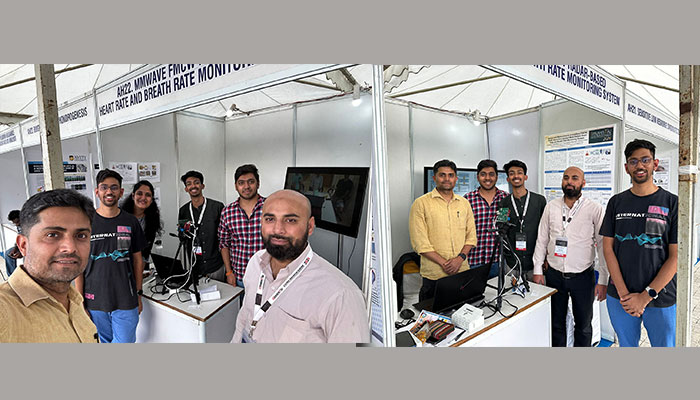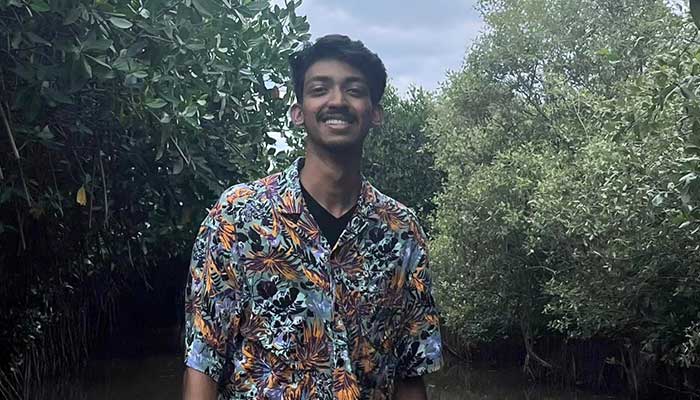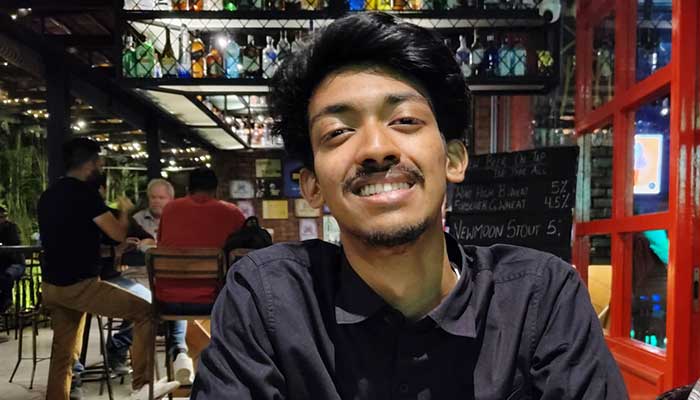Imagine detecting heart rates and breath rates of multiple patients simultaneously. And then again imagine doing it in a non-invasive manner. A novel radar-based mass monitoring system was proposed by undergraduate IIITH researcher Jewel Benny helping him bag the CHANAKYA Fellowship offered by iHub-Anubhuti-IIIT Delhi Foundation.
It was the pandemic that highlighted the importance of contactless technology. Thermal screenings via hand-held infrared thermometers became commonplace. Biometric technology gave way to contactless identification, digital payments registered an uptick and innovations in non-invasive healthcare monitoring surged. For researchers at the International Institute of Information Technology, the motivation to develop a non-contact heart rate (HR) and breath rate (BR) monitoring system stemmed from the same concern of possible device contamination.
Simultaneous Mass Monitoring
Undergraduate researcher Jewel Benny along with Pranjal Mahajan, Srayan Chatterjee, and Mohd. Wajid under the guidance of Prof. Abhishek Srivastava developed a contactless HR and BR monitoring system based on a frequency modulated continuous wave (FMCW) mmWave radar. According to the group, mmWave technologies such as FMCW radars have grown in popularity as non-contact alternatives to wearable devices for mass monitoring of vital signs. “Normally you have oximeters to check the health of patients with any condition that affects blood oxygen levels such as pneumonia, heart failure and so on, but they are not really useful in mass monitoring scenarios or during a pandemic-like situation,” says Jewel Benny to explain the emergence of non-invasive methods. “We wanted a single device that could measure vitals in a contactless manner and for multiple people,” he adds. Previous studies that used FMCW radars for heart rate and breath rate monitoring primarily focused on single subjects. Studies that later dealt with monitoring of vitals of multiple subjects did not achieve simultaneous measurement. The IIITH group’s design not only seeks to simultaneously measure BR/HR of multiple patients but also improve measurement accuracy with its advanced signal processing techniques.
Beyond A Paper
The study titled ‘Design and Measurements of mmWave FMCW Radar-based Non-Contact Multi-Patient Heart Rate and Breath Rate Monitoring System’ was presented at the 2023 IEEE Biomedical Circuits and Systems (BIOCAS) conference where it was well received. The prototype based on the research was built and presented at IInvenTiv-2024 – the Ministry of Education’s flagship R&D Innovation Fair that showcases the impact of research and innovation carried out by the country’s top higher education institutes. Jewel, who is an Honours (BTech, ECE) student, submitted the same proposal for a fellowship programme instituted by the iHub Anubhuti-IIITD Foundation. Titled CHANAKYA, short for Comprehensive and Holistic Advancement of National Knowledge Yield and Analytics, the fellowship programme offers an opportunity to undergraduate, postgraduate and even post doctoral researchers to do an in-depth analysis and identify solutions that have a focus on emerging technologies like cognitive computing and social sensing.

Meeting The Criteria
The iHub Anubhuti-IIITD Foundation is one of 25 technology innovation hubs (TiHs) set up through the National Mission on Interdisciplinary Cyber-Physical Systems (NM-ICPS). Their main goal is to develop tech solutions for people-centric problems via collaborations with industries, academia, and govt agencies. Due to its emphasis on being a translatable healthcare solution with potential to become an entrepreneurial endeavour, Jewel’s radar-based approach bagged the undergraduate CHANAKYA fellowship. It entails a grant of Rs 10,000/- per month for a maximum duration of 10 months.
Translational Research
As a healthcare monitoring device, the IIITH group’s approach finds application in hospitals and such where mass monitoring of health vitals is necessary. “Like an ICU for instance,” remarks Jewel. Outside of hospitals too, unobtrusive monitoring of vitals could come in handy in large spaces such as corporate offices. In addition to these, health monitoring in private spaces such as while driving or riding in a car has seen considerable research interest, especially when a large chunk of commuters’ time is spent on the road. As per Jewel Benny, the fellowship will help in extending the research project. “We are currently working on improving accuracy and latency of the radars in the system,” he mentions, while adding that a patent will also be filed soon.
IIITH’s ECE Programme
Jewel who is a Kochi-born and bred youngster is in his final year of college and recalls what brought him to IIITH in the first place. “I chose IIIT primarily because even in school, I had a keen interest towards circuit branches and Computer Science, basically anything related to computers. IIITH seemed like a perfect choice for me because I liked the curriculum and also because it was in Hyderabad,” he says. For him, the IIITH ECE programme seemed quite unique compared to the other colleges due to the flexibility it offers. “Not many colleges let you dive deeply into fields other than your major. At IIITH, you can forge any path you want. If you want to do core ECE, you are welcome to do that; if you want to dive more into systems side or into the computer science or AI side also, the college lets you do that without any issue,” he explains.

Life at IIITH
As a freshman who joined IIITH during the pandemic, Jewel admits that it wasn’t a great start thanks to an entire year of online classes. “Things changed though as soon as I came to college for offline classes. I feel that the small batch size of the college is a big boon as you are exposed to much more opportunities and responsibilities than you would elsewhere. Personally, I wanted a well-rounded college life with a little bit of everything – academics, research, co-curricular activities and I was able to stick to that”. Jewel’s academic record is testimony to that. Despite being cultural secretary in his third year, member of multiple clubs, and part of the Felicity core team, he not only maintained his grades but also got a research paper published “with hopefully more on the way”. And unlike the cliched views of being hard pressed to get a life at IIITH, Jewel mentions that he had plenty of spare time to explore Hyderabad with his friends. “The peer group that you get here really does push you to do better and I’m very grateful for that,” signs off the soon-to-be graduate with a corporate pre-placement offer in hand.



Next post